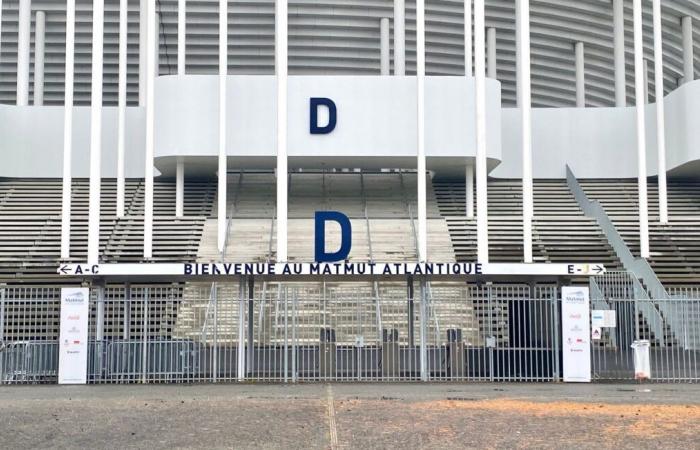Will the Girondins de Bordeaux drag down the operator of the Matmut Atlantique stadium, the company SBA (Stade Bordeaux Atlantique)? A little over six months after the football club's demotion to National 2, the equivalent of the fourth division, SBA is on the verge of filing for bankruptcy. But the collapse of the Girondins seems to be, ultimately, only the glass that broke the camel's back, the operation of the stadium having been regularly in deficit since its construction in 2015, with cumulative losses approaching 20 million euros.
The question that was on everyone's lips at the start of the last school year is now burning in January: what will become of the 42,000-seat Matmut Atlantique venue (which will soon lose its name with the end of the naming contract)? Built during the Juppé era as part of a PPP (Public-Private Partnership) lasting thirty years, notably to host the 2016 Euro football tournament, the stadium is the property of the Bordeaux metropolis. But it is operated and maintained by SBA, a subsidiary of the construction groups Vinci and Fayat.
Too expensive to “make a stadium available to a club” according to Hurmic
The president of Bordeaux Métropole, Christine Bost, said Tuesday that the community was preparing for all eventualities, in particular the liquidation of SBA, and that it could resume the management of the stadium but not its operation (i.e. organizing events). The Metropolis will nevertheless have to continue to pay what it owes for the construction, i.e. 5 million euros per year, unless the banks claim the entire sum – 85 million euros – from a Suddenly, an option that the elected official seems to rule out.
On Thursday, the mayor of Bordeaux, Pierre Hurmic, also estimated that the metropolis would certainly “have to take over management of the stadium, initially at least. » “I don't think that a city or a metropolis has the vocation to sustainably manage such equipment, which is extremely expensive,” he adds. On the other hand, professional football must become autonomous. Making a stadium available to a club is a significant financial commitment on the part of the community. These are clubs that make millions and millions, these millions must also be used to buy the land for their players. This is why I do not despair that a possible buyer of the Girondins will also buy the Grand Stade. I tend to think that we will sell the club more easily if we put an asset of this nature in the trash. »
“If a private partner comes forward, they will negotiate downwards”
But how could the financial situation have gotten so out of hand in Bordeaux? “There was a combination of several elements,” estimates Guillaume Gouze, consultant at the economic center of the Limoges Law and Sport Center and co-director of the CDES Stadium Manager diploma. Vinci is a group which has strong expertise in the management of infrastructure including stadiums, but we find ourselves faced with a private operator who has failed to stick to its business plan. There were also external elements – the rise in energy costs, for example – which contributed to the stadium's poor results. The unfortunate conclusion is that the public authorities will have to recover this equipment at their own expense. » And Guillaume Gouze warns that with the approach of the municipal elections in March 2026, this issue can quickly become “explosive. »
What would be the best solution for the future of the stadium, according to the specialist? “There isn't one, it will be the least bad one that will be chosen. Ultimately, a private investor would have to be found. But be careful, they are not crazy. They clearly saw that it was not working and that there is currently no viable resource via football given the situation of the Girondins. If a private partner comes forward, he will negotiate downwards. Will the community be committed to finding a partner at all costs? »
Would a partnership between UBB and the Girondins be possible?
Another option, according to Guillaume Gouze, would be to “create a common operating structure between the Girondins and the UBB [le club de rugby]. » The UBB could thus “take over management of the stadium by entering into an agreement with the community, and the two clubs would ensure its development. But can they agree on this? »
-Our file on the Girondins de Bordeaux
Above all, Laurent Marty, president of the UBB, insisted that he was not interested in the Grand Stade, and that his club remained very attached to the Chaban-Delmas stadium. “We know that the best way to get something at the price you want is to say that you are not interested,” analyzes Guillaume Gouze. “That said, it would be a big change for UBB. » The matter is therefore far from being in the bag.
“No political error” in this matter, believes the specialist
Ten years after the construction of the Grand Stade, what analysis can be made of Alain Juppé's choice to provide Bordeaux with this equipment and to favor the PPP? “The feedback that we can draw from these public-private partnership models for football stadiums is that they are models that do not work,” analyzes Guillaume Gouze.
“They were privileged at the time when France was applying to win Euro 2016,” he recalls. The communities did not have the money to invest in large stadiums, so they entered into contracts with private partners to build them, in exchange for which they entrusted them with the management of the operation over thirty years. We see that these models are ultimately not good for private operators, since we see other examples flourishing, in Nice, Lille or Marseille, even if they are not in the critical situation of Bordeaux. »
The same goes for public finances: “we knew that these PPPs were time bombs” continues the specialist. Even if he adds that “the Bordeaux deal was rather good for the local authority compared to other infrastructures”, and that according to him, “there was no political error” in this matter.
“We can always question the need to have large equipment,” concludes Guillaume Gouze. Should Bordeaux place itself on the map of major sporting events and major concerts? Should it meet a need for social utility? It's all a question of political choice. »






